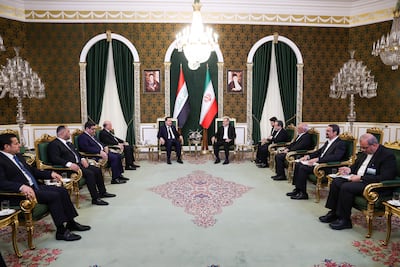Iraq is planning to host an international conference to discuss developments in the region, the country's Prime Minister Mohammed Shia Al Sudani announced on Wednesday during an official visit to Iran.
“We call for a comprehensive regional dialogue that strengthens trust among the countries of the region and ensures security and peace for all,” Mr Al Sudani said during a joint press conference with Iranian President Masoud Pezeshkian. He did not specify a date but said it would occur “in the upcoming period”.
Both leaders discussed regional developments, particularly Syria's political transition and bilateral ties, following up on Iranian President Pezeshkian's visit to Baghdad in September.
Iran and Iraq were strong supporters of the former Syrian regime under Bashar Al Assad, which was overthrown by an offensive led by Hayat Tahrir Al Sham (HTS) last month. Only days before, the Iraqi and Iranian foreign ministers had met the Syrian foreign minister in Baghdad and reaffirmed their support of the regime in Damascus.
“Both countries share common concerns regarding the developments in Syria, including stability and calm in the country, preserving Syria's territorial integrity and combating the terrorist groups,” Mr Pezeshkian said, adding that other concerns are “the necessity of the Zionist entity withdrawal from the occupied areas, and respecting religious and sectarian sentiments, particularly the holy Shiite shrines”.

“It requires greater intelligence and wisdom between the two countries when addressing the threat of terrorism and the reactivation of terrorist cells,” he added.
Iraq has cautiously welcomed the regime change in Syria and is calling for an inclusive political process. However, it has expressed concerns over the continuing situation in Syria, warning of the danger of a resurgent ISIS, sending more troops to the borders. Iraqi officials have warned that the numbers of extremist group's militants have increased and that they have seized more weapons.
Last month, Iraq sent a senior security delegation led by the Head of the Intelligence Service Hamid Al Shatri who met HTS leader and the Commander of Syria's new administration Ahmad Al Shara. They discussed several security-related issues, particularly the borders.
Iraqi Foreign Minister Fuad Hussein last week congratulated new Syrian Foreign Minister Asaad Al Shibani and stressed Baghdad's commitment to restoring its diplomatic staff to Syria. Iraq is also set to reopen its Al Qaim border crossing with Syria soon, Iraqi officials told The National.
“We believe that Syria's stability is the key to the stability to the entire region,” Mr Al Sudani said. “Therefore, we call for a comprehensive political solution that preserves Syria's sovereignty and territorial integrity, and puts an end to foreign interventions that harm the interests of the Syrian people,” he added.
He expressed Iraq's readiness to “co-operate with all parties to enhance Syria's stability, contribute to achieving a smooth and peaceful transition to a system that reflects the will of the Syrian people”.

“Syria should be able to decide its own fate and future without the destructive intervention of regional or international parties and not become a place for the growth of terrorism and violent extremism,” said Iran's Foreign Ministry spokesman Esmail Baghaei on Monday. Developments in Syria's political transition will be on the agenda when Mr Al Sudani visits Tehran on Wednesday.
With the collapse of the Al Assad regime in Syria, Iraq remains one of Iran's last key supporters in the region. Since the fall of Saddam Hussein in 2003, Baghdad and Tehran have shared strong religious, political and economic ties. Iran enjoys strong influence over its neighbour and backs dozens of armed groups there as part of its Axis of Resistance which has suffered severe blows by Israeli attacks on allies in Gaza, Lebanon, Syria and Yemen. These groups also participated in attacks against Israeli assets, particularly at the start of the war in Gaza in October 2023.
The developments in Syria come against the backdrop of the continuing war in Gaza and a fragile ceasefire in place between Israel and Iranian ally Hezbollah.
On Wednesday, Iranian supreme leader Ali Khamenei told Mr Al Sudani that the Popular Mobilisation Forces, a collection of militias mainly backed by Iran “must be preserved and strengthened,” while the US presence in Iraq was “illegal and contrary to the interests of the people and government of Iraq”.
The US said last year it would withdraw troops from parts of Iraq, which currently number about 2,500, but some would remain for years to come.
During his first visit to Iraq in September, Mr Pezeshkian said Iran was seeking to further improve its ties with Baghdad. His three-day trip featured the signing of 14 agreements in various fields.
Aveen Karim contributed from Abu Dhabi.


